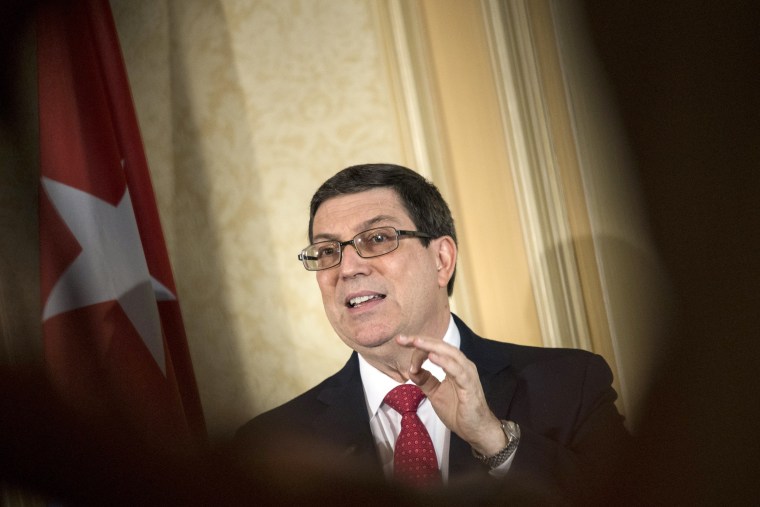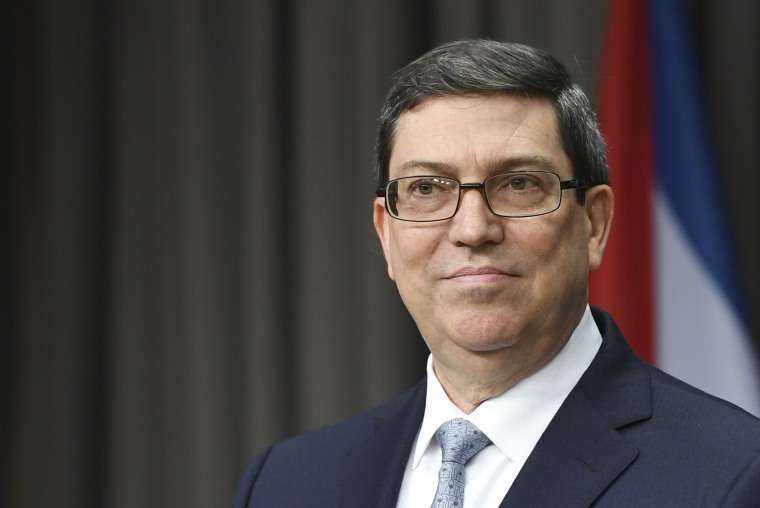VIENNA — Cuba’s Foreign Minister lashed out at Donald Trump's decision to restrict U.S. travel and business with his country on Monday, calling the president's announcement last week "a grotesque spectacle that came out of the Cold War."
"There will not be a presidential directive from the U.S. that will alter the direction of Cuba," Bruno Rodriguez told journalists in Vienna, where he was meeting with Austrian officials.
"We have gone through everything, our people have gone through everything," he said. "What could they menace us with now that they haven't before and failed?"
The broadside came just days after Trump told an enthusiastic crowd in Miami that he was “canceling” the deal his predecessor Barack Obama struck with the government of President Raul Castro. That decision to normalize relations with Cuba and begin removing sanctions ended a decades-long freeze of diplomatic ties with the Communist government.
Rodriguez was scathing about Trump's appearance on Friday, saying the president had surrounded himself with the extreme section of the Cuban-American community who he called "mercenaries" and "terrorists." Trump unveiled his policies in the largely Cuban-American crowd in Miami's Manuel Artime Theater, named after a leader of the failed Bay of Pigs invasion of 1961.
The Trump administration says it is changing the policy toward Cuba by limiting the amount of money that might go toward the country’s military-linked businesses, restricting American tourism there and reaffirming the 56-year-old trade embargo.
The U.S. will keep a U.S. embassy open in Havana and allow American airlines and cruise ships to travel there, while Cuban-Americans will still be able to send money to relatives and travel to the island.
"It looks like revisiting the same policy that didn't work for 50 years — it is a failed policy," Rodriguez said.
Rodriguez also criticized Trump’s pledge to "empower the Cuban people to develop greater economic and political liberty."

"It is surprising that a president who has based all his policies on things that are very distant from human rights proposes ... as a top priority the defense of human rights in Cuba," he said.
Trump talks "about business interests, making America great again," he told NBC News. "They have nothing to do with human rights. When it comes to Cuba, the massive and systematic harm to human rights comes from the blockade ... and President Trump proposes to harden it."
Mike Gonzalez, a senior fellow at conservative Washington think tank The Heritage Foundation, applauded Trump’s emphasis on human rights and democracy in Cuba, telling NBC News that the ongoing repression there was a "global outrage and a shame."
He added that Trump’s decision "is about U.S. national interests but also about the interests of humanity — these poor people."
International campaigner Human Rights Watch reported that the Cuban government has long repressed dissent and criticism — and it has gotten worse.
Arbitrary arrests of human rights defenders, independent journalists, and others have grown “dramatically” in recent years, it says. “Other repressive tactics employed by the government include public acts of shaming and the arbitrary termination of employment," it adds.
The Cuban Commission for Human Rights and National Reconciliation — an independent group that lacks authorization and is considered illegal by the government — received more than 7,900 reports of arbitrary detentions from January through August last year, according to Human Rights Watch. This is the highest monthly average of detentions in the past six years, it added.
Human Rights Watch warned, however, that ordinary Cubans — the people that Trump said his move sought to help — would suffer as a result of last week’s decision.
"The previous administration was right to reject a policy that hurt ordinary Cubans and did nothing to advance human rights,” Daniel Wilkinson, managing director for the Americas at the organization, said in a statement. “The fact that Obama’s approach hasn’t led to political reform in Cuba after just a few years isn’t reason to return to a policy that proved a costly failure over many decades.”
Others questioned why the White House was taking the high road when it came to Cuba, but not other countries.
“Why is Cuba the only country in the world Trump allegedly cares about human rights?” wrote Michael McFaul, former U.S. Ambassador to Russia and former Special Assistant to the President at National Security Council under Obama.
Rodriguez echoed this point saying that when Trump was recently in Saudi Arabia, "He said 'We are not here to tell other people how to live.' Last Friday he said quite the opposite. Sad."

